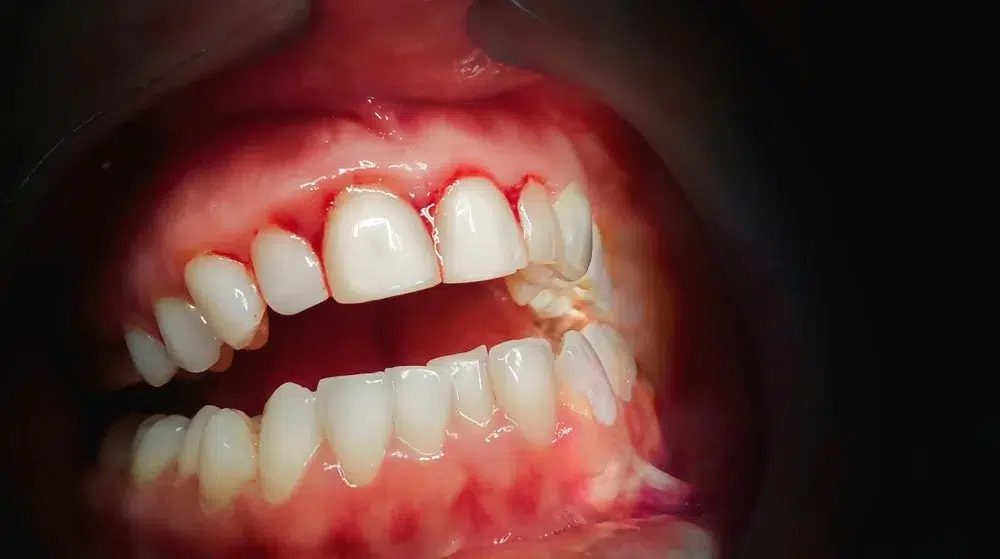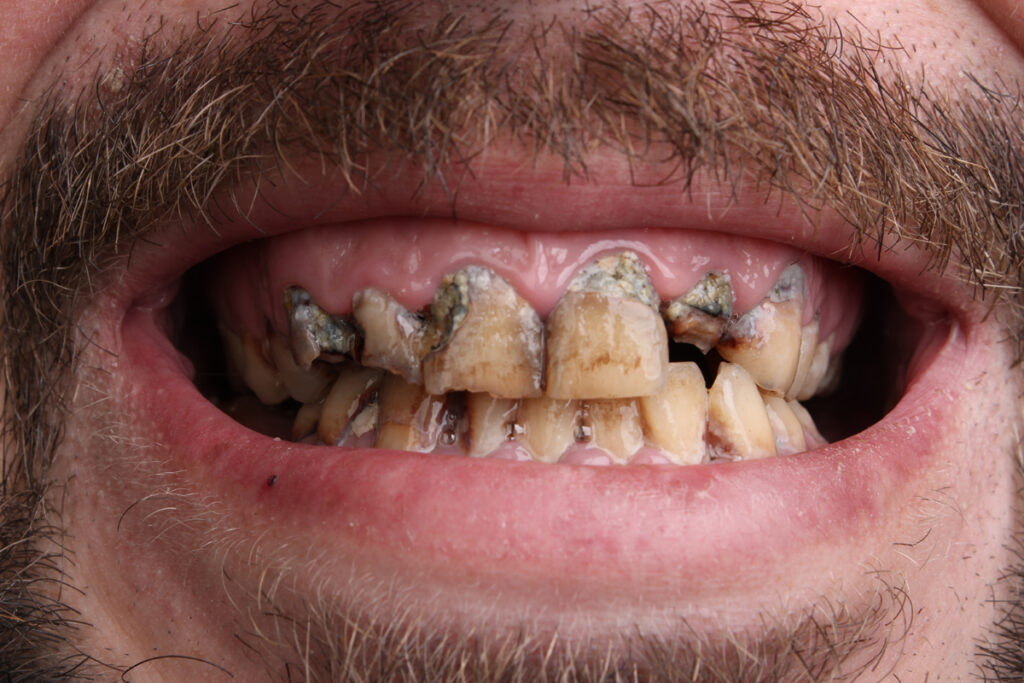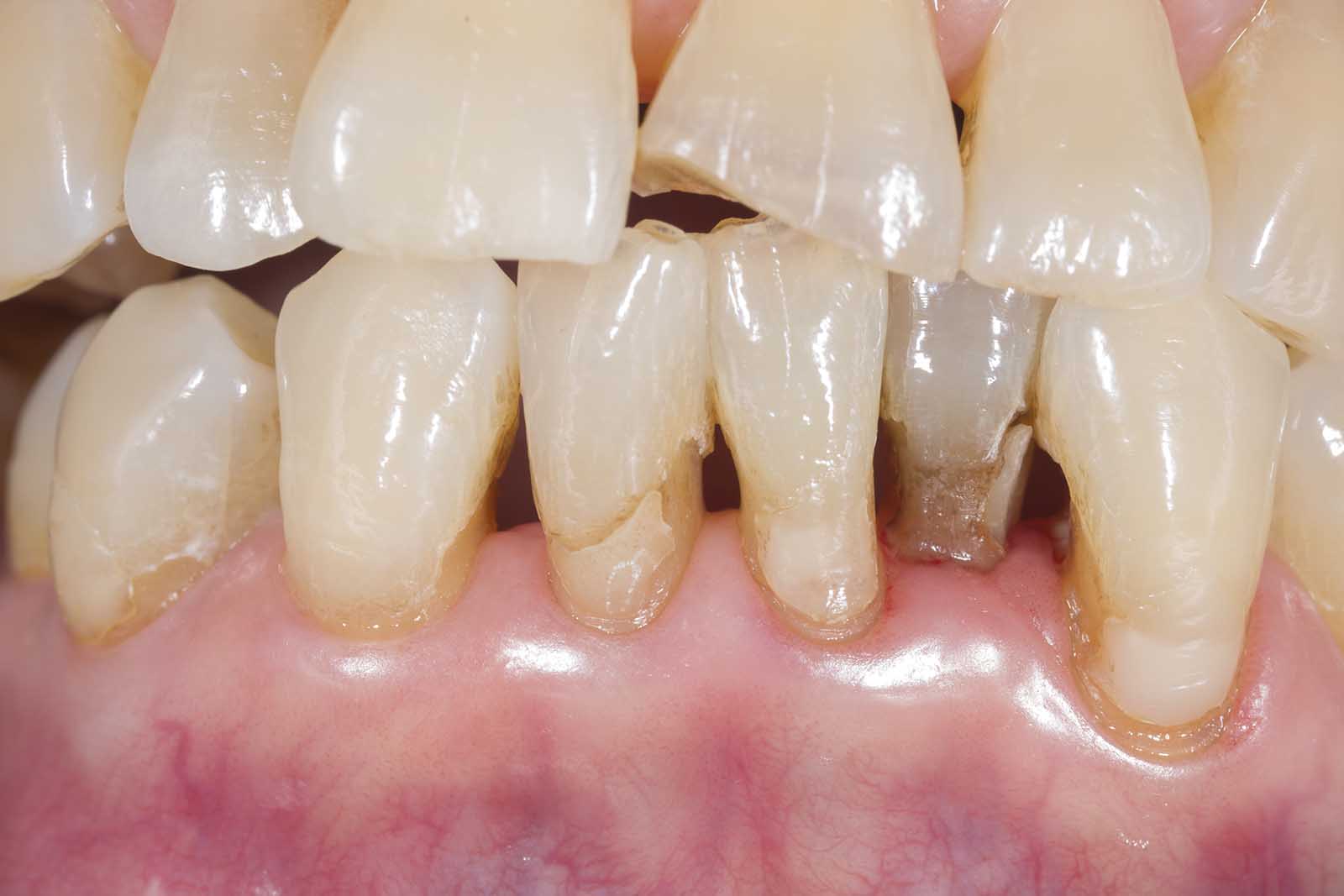Table of Contents
Gum inflammation, medically known as gingivitis, is a common condition characterised by the inflammation of the gums.
Left untreated, it can lead to more severe gum disease, such as periodontitis.
Here are the causes and symptoms associated with gum inflammation:
Causes of Gum Inflammation
Gum inflammation, a precursor to more severe gum disease, can significantly impact oral health if not addressed promptly.
The causes of this condition are multifaceted, ranging from everyday habits to genetic factors, each contributing to the development of gingivitis in different ways.
Plaque Build-up: The Foremost Culprit of Gum Inflammation
The primary antagonist in the story of gum inflammation is plaque. This sticky, bacteria-laden film relentlessly forms on and between your teeth and the gum line.
This bacterial assembly is not just a superficial nuisance; its persistence is the leading cause of gum inflammation.
Daily brushing and flossing are critical in disrupting this cycle, as neglected plaque hardens into tartar, a substance that only professional dental cleanings can remove.
Tartar exacerbates gum inflammation, setting the stage for more advanced periodontal issues.
The Impact of Poor Oral Hygiene
Good oral hygiene is a cornerstone of gum health. Regular brushing and flossing are essential defences against plaque accumulation.
When these routines are neglected, plaque is allowed to remain on the teeth and gums, providing a constant source of irritation that leads to gingivitis.
Thus, inadequate oral hygiene directly contributes to the prevalence of gum inflammation, highlighting the importance of daily dental care practices.
Tobacco Use: A Significant Risk Factor
The consumption of tobacco products, whether through smoking or chewing, is a well-documented risk factor for gum inflammation.
Tobacco fosters a conducive environment for plaque buildup and diminishes the effectiveness of any treatment efforts.
The chemicals in tobacco products such as snus exacerbate the inflammatory response in the gums, making tobacco users significantly more susceptible to gum diseases.
Hormonal Changes and Gum Sensitivity
Life stages characterised by hormonal fluctuations, such as puberty, pregnancy, menopause, and even the menstrual cycle, can render the gums more sensitive and more prone to inflammation.
Even the slightest irritation can provoke a heightened response during these periods, increasing the gums’ vulnerability to gingivitis.
Medications and Oral Health
Certain medications indirectly promote gum inflammation by reducing saliva flow, a natural protective mechanism for the mouth.
Dry mouth conditions allow plaque to adhere more easily to teeth and gums, accelerating inflammation.
Moreover, some drugs encourage abnormal growth of gum tissue, further complicating oral hygiene efforts and exacerbating gum sensitivity.
Underlying Medical Conditions
Chronic conditions such as diabetes, cancer, HIV, and other immune-compromising illnesses elevate the risk of developing gum inflammation.
These conditions can weaken the body’s immune response, making it harder to combat the bacteria responsible for gingivitis and allowing inflammation to progress more rapidly.
Genetic Susceptibility to Gum Disease
Lastly, genetics cannot be overlooked as contributing to gum inflammation.
Due to their genetic makeup, some individuals are inherently more predisposed to developing gum disease, including gingivitis. This heightened susceptibility means that for some, even with rigorous oral hygiene practices, the risk of gum inflammation remains higher than average.
In summary, the causes of gum inflammation are diverse, encompassing lifestyle choices, health status, and genetic predispositions.
Understanding these factors is crucial in preventing and managing gingivitis, underscoring the importance of regular dental check-ups and personalised care routines.
Symptoms of Gum Inflammation
Gum inflammation is a common yet potentially severe condition. It manifests through various symptoms that can affect oral health and overall well-being.
Understanding these signs in detail can help identify the condition early, allowing for timely intervention and treatment.
The Hallmark of Inflammation: Red and Swollen Gums
The initial and perhaps most recognisable gum inflammation symptom is the gums’ appearance and texture change.
Gums become red, swollen, and exceptionally tender, a stark deviation from their healthy, pink state. Inflammation is not just a superficial concern; it indicates an ongoing battle between the body’s immune system and the bacteria lodged at the gum line.
The visual and tactile changes in the gums serve as a clear signal of underlying issues that require attention.
The Warning Bleed: Gum Bleeding
Bleeding gums are a significant and alarming symptom of gum inflammation. This bleeding can occur spontaneously or during routine oral hygiene practices, such as brushing and flossing.
The sight of blood after brushing is not regular and is often one of the earliest indicators of gingivitis. It underscores the need for improved oral hygiene practices and possibly professional dental care to address the underlying cause of the inflammation.
Gum Recession: The Shrinking Gums
Gum recession is a symptom that develops over time. It occurs when the gums begin to pull away or recede from the teeth. This process exposes more of the tooth and its root, making the teeth appear longer than usual.
Gum recession is particularly concerning because it creates new pockets between the teeth and gums, spaces that can harbour bacteria and lead to further dental issues, including tooth loss.
The Unwelcome Oral Odour: Bad Breath
Persistent bad breath, halitosis, and a constant bad taste in the mouth are often indicators of gum inflammation.
These symptoms arise from the bacteria and food particles trapped in the inflamed gum pockets, producing odours and tastes that brushing, flossing, or mouthwash temporarily mask but do not eliminate.
Bad breath associated with gum inflammation indicates that the condition is advancing and needs addressing beyond routine oral hygiene.
Sensitivity: The Teeth’s Alarm System
As gum recession exposes more of the tooth and its root, teeth become markedly more sensitive to temperature changes.
Sensitivity to hot, cold, sweet, or acidic foods and beverages can range from mild discomfort to sharp, fleeting pain.
The tooth root exposure, which lacks the hard protective enamel found on the tooth crown, makes the teeth vulnerable to external stimuli, signalling the progression of gum issues.
Painful Chewing: When Eating Becomes a Chore
Inflammation and sensitivity can escalate to the point where chewing becomes painful. This discomfort can affect one’s eating habits and nutritional intake, as individuals may start avoiding foods that exacerbate their pain.
Chewing, essential for digestion and nutrition, becomes a calculated exercise in avoiding discomfort, highlighting the impact of gum inflammation on general health.
These symptoms of gum inflammation underscore the importance of maintaining good oral hygiene and seeking professional dental care at the first sign of trouble.
Early detection and treatment can prevent the progression of gum inflammation to more severe conditions, safeguarding oral health and overall well-being.
Prompt treatment and good oral hygiene can often reverse gum inflammation. However, if left untreated, it can become more severe gum disease, leading to tooth loss and other health complications.
If you suspect you have symptoms of gum inflammation, it’s essential to consult your nearest dentist for a proper diagnosis and treatment plan.
Disclaimer: The information provided in this article is intended for educational purposes only and does not replace professional dental advice or treatment. Readers should consult a qualified dental professional for personalised advice and treatment options. The website and its contributors are not responsible for any actions taken based on the content of this article or for any adverse effects. Always seek the guidance of a dental professional for any questions or concerns regarding your oral health.







